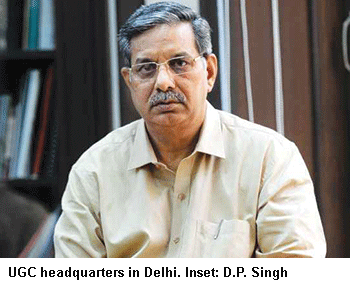 On april 24, the delhi-based University Grants Commission (UGC, estb.1956), the apex Soviet-style body empowered to licence, monitor, and provide discretionary grants-in-aid to all non-technical institutions of higher education, released a list of unrecognised, self-styled universities unauthorisedly operating in contravention of the UGC Act, 1956, and merrily issuing degrees, diplomas and certificates.
On april 24, the delhi-based University Grants Commission (UGC, estb.1956), the apex Soviet-style body empowered to licence, monitor, and provide discretionary grants-in-aid to all non-technical institutions of higher education, released a list of unrecognised, self-styled universities unauthorisedly operating in contravention of the UGC Act, 1956, and merrily issuing degrees, diplomas and certificates.
This is not the first time the commission has released a list of fake universities. UGC issues a list of unauthorised universities in all states almost every year, with some names regularly featuring on its annual warning list. Not a few parents and students express bafflement about why serial offender universities aren’t closed down after being declared ‘fake’ in the first instance, and why the commission restricts itself to merely releasing an annual list of fraudulent institutions.
UGC’s current list of 24 fake universities issued on April 24, includes Maithili University, Bihar; United Nations University and Indian Institute of Science and Engineering, Delhi; St. John’s University, Kerala; Indian Institute of Alternative Medicine, Kolkata; and Netaji Subhash Chandra Bose Open University in Uttar Pradesh, among others. Some of these unauthorised institutions have been named — but obviously not shamed — on the list of fake varsities several times.
Comments Ravi Bhardwaj, a Pune-based education specialist lawyer: “Mere issuance of public notices is not enough. UGC is invested with the power to enforce its rules and norms. It can take penal action in the interest of innocent and gullible students who are defrauded by the promoters of fake universities.”
After connecting with Prof. D.P. Singh, chairman of UGC, your correspondent was directed to senior officials of the commission who however insisted on anonymity. “Every year, UGC issues a list of fake universities through press and electronic media. We also write to state chief secretaries, education ministries etc, to take action against fake universities/institutes operating in their jurisdictions,” says a senior UGC official.
Section 22 (2) of the UGC Act, 1956, explicitly states that “no person or authority” except as specified in s.22 (1) shall confer any degree and that ‘degrees’ need the “previous”, i.e, prior approval of the commission. Moreover, s.23 prohibits corporate and other bodies except as established under s.22 (1) from describing themselves as universities. S.24 imposes a modest fine of Rs.1, 000 on every member of an association or other body which contravenes the provisions of ss.22 and 23.
In 2005, in the then newly constituted state of Chhattisgarh, more than 100 private universities were forcibly shut down by the Supreme Court because the state government’s law permitting private universities to operate, was too lax and inimical to the interests of the students’ community. “On receipt of a complaint against an institute, comments are sought by the UGC from the state government concerned. After that, the state government is requested to take action as deemed fit against fake universities in their administrative jurisdiction. This is an issue which requires the active co-operation of states,” adds the UGC official.
Educationists and academics in the national capital are almost unanimous that the real reason for the reluctance of state governments to shut down fake universities is that the great majority of fly-by-night universities cheating gullible students are promoted by powerful state politicians, including ministers. These politicians, often very wealthy and/or influential, can make or break state governments. Hence the inertia.
And with neither the Central nor state government particularly bothered about this issue, the open, uninterrupted and continuous loot of gullible students will continue even as for form’s sake, UGC keeps issuing its annual list of usual suspects.
Gauri Kohli (Delhi)